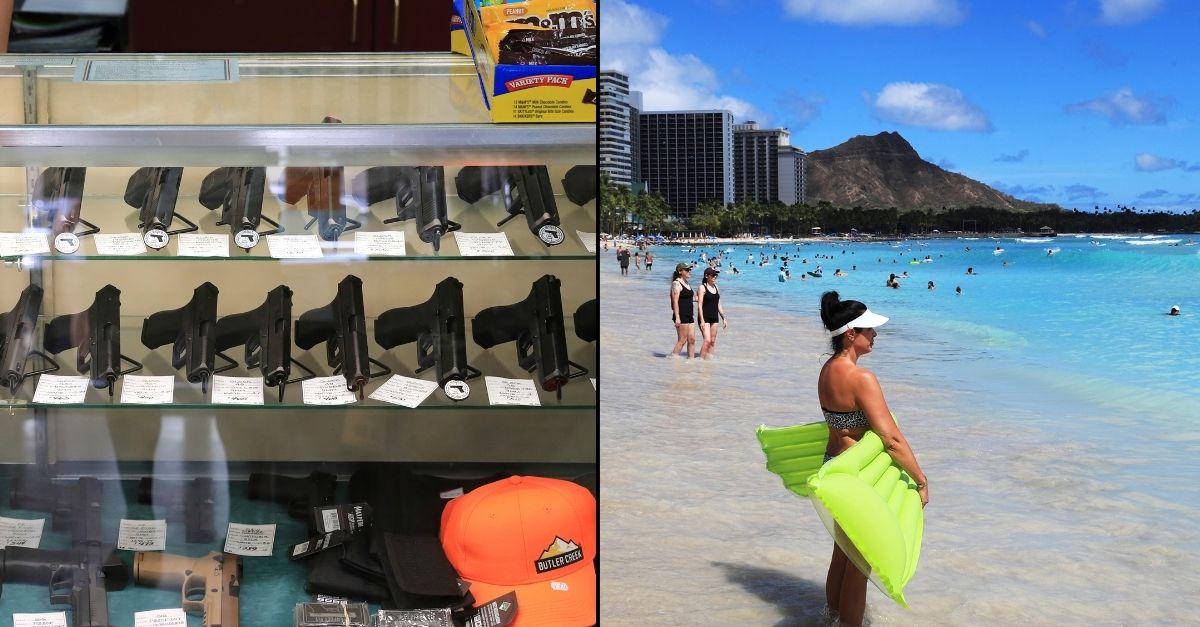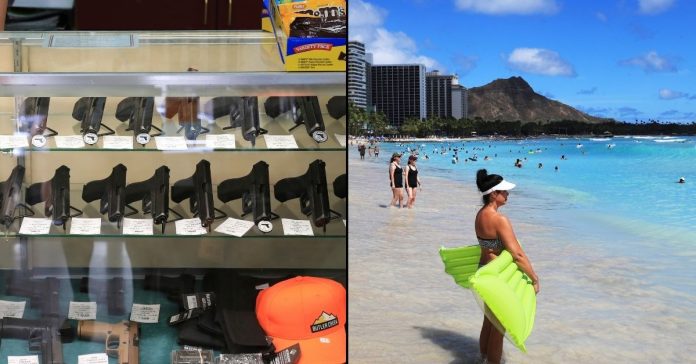
Left: FILE — Handguns are displayed at a gun shop on June 23, 2022, in Honolulu. (AP Photo/Marco Garcia, File)/Right: Beachgoers take to the waves on Waikiki Beach, Thursday, June, 23, 2022, in Honolulu. (AP File)
A ruling from the Hawaii Supreme Court this week found the Second Amendment does not override “the spirit of Aloha” — a local principle that prioritizes the “life force” of Hawaii resident residents and reasserts a historic claim the state’s high court said supersedes “a free-wheeling right to carry guns in public [that] degrades other constitutional rights.”
The ruling was unanimous.
“The spirit of Aloha clashes with a federally-mandated lifestyle that lets citizens walk around with deadly weapons during day-to-day activities,” the 53-page opinion reviewed Friday by Law&Crime states.
“We hold that in Hawaiʻi there is no state constitutional right to carry a firearm in public … The history of the Hawaii resident Islands does not include a society where armed people move about the community to possibly combat the deadly aims of others,” wrote Hawaii Supreme Court Justice Todd Eddins.
Eddins looked to the past to make the court’s point but the 5-0 ruling simultaneously invoked more modern trappings too, including by invoking the gritty HBO television series “The Wire,” which cataloged the crime, gang and gun violence long endemic to Baltimore, Maryland.
As the world turns, it makes no sense for contemporary society to pledge allegiance to the founding era’s culture, realities, laws, and understanding of the Constitution.
“The thing about the old days, they the old days.” The Wire: Home Rooms (HBO television broadcast Sept. 24, 2006) (Season Four, Episode Three).
Though the state’s constitution “mirrors” the U.S. Constitution under the Second Amendment, Hawaii is not frozen in time with the framers, the court continued.
Nor should Hawaii be forced to legislate public safety laws that “must look like laws passed long ago.”
“Smoothbore, muzzle-loaded, and powder-and-ramrod muskets were not exactly useful to colonial era mass murderers. And life is a bit different now, in a nation with a lot more people, stretching to islands in the Pacific Ocean,” Eddins wrote. “Regulations like storing powder safely, reporting with guns for militia “musters” (weapons inspection), and loyalty oaths are hardly helpful to address contemporary gun violence. Yet those odd laws have historical and traditional roots. Democratically-vetted laws, though — measures taken by today’s citizens to save lives — are mostly out of bounds.”
The state’s constitution and the U.S. version read nearly identically as it pertains to a “well regulated militia” and the Hawaii resident constitution states too that the right of people to “keep and bear arms shall not be infringed.”
But in a single voice, all five justices wrote that they “read those words differently than the current United States Supreme Court” and as it had been understood before the 2008 ruling in District of Columbia v. Heller.
Importantly, State of Hawaii vs. Christopher Wilson does not throw out the concept of firearms altogether. Instead, the opinion establishes that states retain the authority to require people to obtain a permit for their firearm before they carry it in public.
In 2017, according to the Hawaii State Judiciary, resident Christopher Wilson was charged with trespass as well as carrying a firearm and ammunition in public. His firearm was unregistered in Hawaii. The man claimed he purchased the gun in Florida and that he carried it while hiking the mountains in Maui. Wilson’s charges were eventually dismissed when he argued that a 2022 ruling, New York State Rifle & Pistol Assn’ v. Bruen, violated his Second Amendment right under both the U.S. Constitution and Article I, section 17 of the Hawaii Constitution. The state appealed, arguing Wilson’s interpretation of Bruen lacked standing.
Notably, as Law&Crime reported in 2022, it was U.S. Supreme Court Justice Clarence Thomas who led the opinion striking down Bruen.
In Hawaii’s ruling, the court explained its position on whether Wilson’s rights were infringed:
We reject Wilson’s constitutional challenges. Conventional interpretive modalities and Hawaiʻi’s historical tradition of firearm regulation rule out an individual right to keep and bear arms under the Hawaiʻi Constitution.
In Hawaiʻi, there is no state constitutional right to carry a firearm in public.
Bruen snubs federalism principles. Still, the United States Supreme Court does not strip states of all sovereignty to pass traditional police power laws designed to protect people. Wilson has standing to challenge HRS § 134-25(a) and § 134-27(a). But those laws do not violate his federal constitutional rights.
A lawyer for Wilson did not immediately respond to a request for comment.
Have a tip we should know? [email protected]

